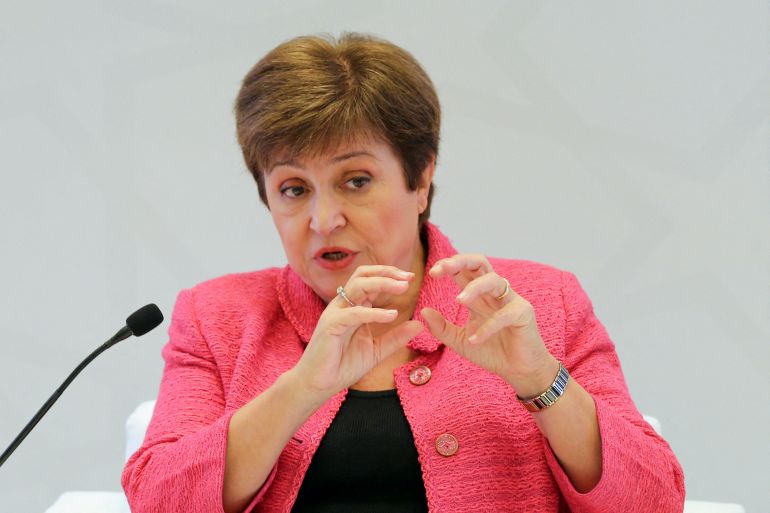IMF chief sees 2023 global growth forecast holding steady
IMF Managing Director Kristalina Georgieva says 2023 to be another “tough year” for the global economy.

The International Monetary Fund (IMF) is not expected to downgrade its forecast for 2.7 percent growth in 2023, the head of the global lender has said, noting that concerns about an oil price spike had failed to materialise and labour markets remained strong.
IMF Managing Director Kristalina Georgieva said 2023 would be another “tough year” for the global economy and inflation remained stubborn, but she did not expect another year of successive downgrades like those seen last year, barring unexpected developments.
Keep reading
list of 4 itemsWhy is the halal economy booming?
Singapore’s economy beats forecasts with 3.8% growth in 2022
Global economy ‘perilously close’ to a recession: World Bank
“Growth continues to slow down in 2023,” she told reporters at the IMF’s headquarters in Washington, DC. “The more positive piece of the picture is in the resilience of labour markets. As long as people are employed, even if prices are high, people spend… and that has helped the performance.”
She added that the IMF does not expect any significant downgrades. “That’s the good news.”
Georgieva said the IMF expected the slowdown in global growth to “bottom out” and “turn around towards the end of ’23 and into ’24”.
Georgieva also said there was much hope that China – which previously contributed some 35 percent to 40 percent of global growth, but had “disappointing” results last year – would once again contribute to global growth, likely from mid-2023. But that depended on Beijing not changing course and sticking to its plans to reverse its zero-COVID policies, she said.
She said the United States, the world’s biggest economy, was likely to see a soft landing and would suffer only a mild recession, if it did enter a technical recession.
But Georgieva said great uncertainty remained, including a significant climate event, a major cyberattack or the danger of escalation in Russia’s war in Ukraine, for instance through the use of nuclear weapons.
“We are now in a more shock prone world and we have to be open-minded that there could be risk turn that we are not even thinking about,” she said. “That’s the whole point of the last years. The unthinkable has happened twice.”
She cited concerns about growing social unrest in Brazil, Peru and other countries, and said the effects of tightening financial conditions remained unclear.
But inflation remained “stubborn” and central banks should continue to press for price stability, she added.